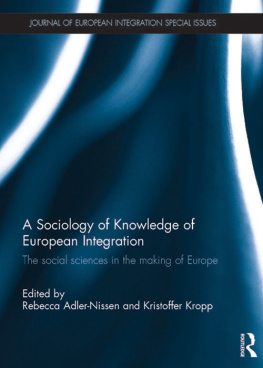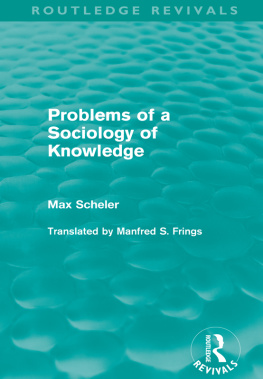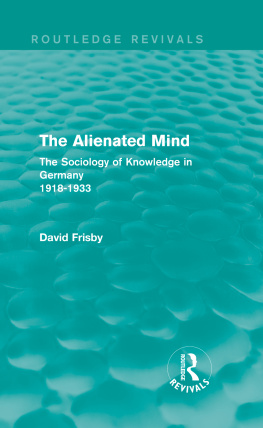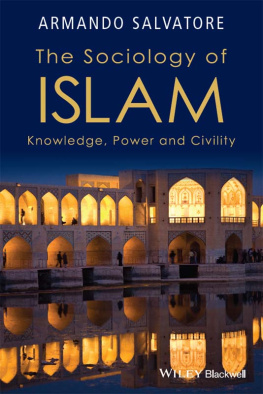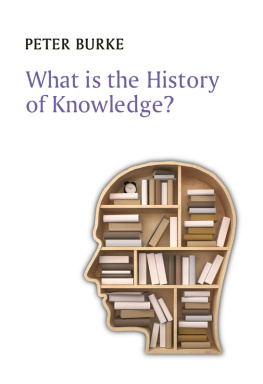ROUTLEDGE LIBRARY EDITIONS:
SOCIAL THEORY
Volume 37
KNOWLEDGE AND
SOCIAL STRUCTURE
KNOWLEDGE AND SOCIAL STRUCTURE
An introduction to the classical argument in the sociology of knowledge
PETER HAMILTON
First published in 1974
This edition first published in 2015
by Routledge
2 Park Square, Milton Park, Abingdon, Oxon, OX14 4RN
and by Routledge
711 Third Avenue, New York, NY 10017
Routledge is an imprint of the Taylor & Francis Group, an informa business
1974 Peter Hamilton
All rights reserved. No part of this book may be reprinted or reproduced or utilised in any form or by any electronic, mechanical, or other means, now known or hereafter invented, including photocopying and recording, or in any information storage or retrieval system, without permission in writing from the publishers.
Trademark notice: Product or corporate names may be trademarks or registered trademarks, and are used only for identification and explanation without intent to infringe.
British Library Cataloguing in Publication Data
A catalogue record for this book is available from the British Library
ISBN: 978-0-415-72731-0 (Set)
eISBN: 978-1-315-76997-4 (Set)
ISBN: 978-1-138-79095-7 (Volume 37)
eISBN: 978-1-315-75804-6 (Volume 37)
Publishers Note
The publisher has gone to great lengths to ensure the quality of this reprint but points out that some imperfections in the original copies may be apparent.
Disclaimer
The publisher has made every effort to trace copyright holders and would welcome correspondence from those they have been unable to trace.
Knowledge and social structure
An introduction to the classical argument in the sociology of knowledge
Peter Hamilton
Routledge & Kegan Paul
London and Boston
First published in 1974
by Routledge & Kegan Paul Ltd
Broadway House, 6874 Carter Lane,
London EC4V 5EL and
9 Park Street,
Boston, Mass. 02108, U.S.A.
Printed in Great Britain by
Ebenezer Baylis & Son Ltd
The Trinity Press, Worcester, and London
Peter Hamilton 1974
No part of this book may be reproduced in
any form without permission from the
publisher, except for the quotation of brief
passages in criticism
ISBN 0 7100 7746 7 (c)
ISBN 0 7100 77866 (p)
Library of Congress Catalog Card No. 7386574
Contents
For Susan
As its title somewhat grandiosely suggests, the primary aim of this study is the presentation, elucidation and analysis of the developments which have characterized the sociology of knowledge, and which have set for it the outlines of its major problematics. However, the study is neither exhaustive nor analytically complete. It represents a more or less idiosyncratic journey through the subject-field in which the author picked out those contributions or uvres which seemed to him to have had the most obvious influence upon the progression of a distinctive sociology of knowledge. Thus the analysis excludesbut does not intend to derogate by doing sosuch notables as Lvy-Bruhl, Grnewald, De Gr, Znaniecki, Merton and Parsons, all of whom deserve mention in one respect or another. It is merely time and energy which have prevented their inclusion. However, what remains is a particular interpretation of what constitutes the primary elements of a distinctive field of study concerned with a determinate relationship between knowledge and social structure. What I have done is to take each of the most distinctive approaches to the explication of such a postulated relationship, and reconstruct them analytically so as to present a coherent way into looking at how they affect that explication. Consequently I have discussed and analysed the three main pre-paradigmsthat the political, social or economic interests of a group of knowledge-producers were seen to be responsible for the distortion of that knowledge in directions suitable to those interests. The whole idea of ideological thought, that existential conditions may affect the validity of thought, is a property of Enlightenment philosophy, which first began to inquire systematically into human social organization. What the Enlightenment produced was a way of looking at the world which had some components, empiricist, individualistic and positivist though they may be, which were at least sociological. From these beginnings, and particularly from the critical rationalism which underlay Enlightenment thought, came the rational analysis of social phenomena, the creation of social theory, and the eventual production of a sociology of knowledge.
Traditionally, our knowledge of the world, of ourselves and of other people has been consigned to philosophy, as a problem resolvable in terms of epistemological theories. The creation of empiricist epistemologies by Enlightenment thinkers, and notably David Hume, meant that knowledge had to be seen in terms of the existential conditions in which it was produced; in this case the experience of the thinkers.
I have tried to present an account of each of the sociologies of knowledge considered which deals with them in terms of five main areas:
1 as sociologically orientated theories of knowledge, which involves a consideration of their definitions of knowledge, and of its relationship to society or social system;
2 in respect of the intellectual bases, philosophical, sociological, etc., of the theories put forward;
3 as distinctive methods of analysing the relationships imputed between knowledge and social structure;
4 in terms of the extent to which their concepts are:
(a) scientific (rather than philosophicalmetaphysical) and (b) at least minimally sociological in the sense of referring either to basic units of social action, or to supra-individual collectivities of social actors;
5. the extent to which each of the theories examined is internally consistent.
The conclusion is written in the belief that in some sense these aims have been achieved, and attempts additionally to suggest an inclusive perspective for approaching the problems posed in any attempt to describe and explain determinate relations between knowledge and social structure.
To introduce a primarily analytical essay by reference to a group of thinkers whose significance is to many purely historicalbearing no concrete relationship to modern trends in, or theoretical developments of, the sociology of knowledgerequires some justification. Let me very briefly provide that justification by outlining the aims of this preliminary chapter. First, I want to demonstrate that we should consider the Enlightenment philosophes (I propose to use through-out this essay the term philosophes, without quotation marks, as the most acceptable synonym for the men of the Enlightenment: my reasons are based on Gays reason for the same usage) as those who produced the first steps towards a modern social science in general, and to a modern sociology in particular. And second, I would like to show that in producing an elementary sociology they also produced, largely as a result of the critical rationalism which informed and underlay their whole program (as Peter Gay has called it,) a theory of ideology which can be regarded quite properly as inaugurating the sociology of knowledge as an integral part of Western social theory.








